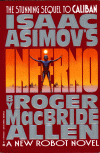I am always open to suggestions when it comes to discovering new authors. By new, I mean to me, not new to writing. For example, I discovered Isaac Asimov a few years after his death, when he had already written over 400 books. Recently, one of my friends suggested I read the Star of the Guardians series by Margaret Weis. He had read it a long time ago, but was rereading the series again. I figured if it was good enough for him to read twice, I should give it a try. Weis offers an eloquent introduction to the series by first clarifying the genre her books fall into. Many fantasy readers might recognize her name as a co-author of many of the Dragonlance books.
If Fantasy is a romance of our dreams, then Galactic Fantasy is a romance of our future
…
Galactic Fantasy is certainly not science-fiction. Sci-fi often deals with the romance of plastic and chrysteel; our love and worship of technology.
…
I believe that man will reach the stars. When he does, the ‘science’ of how our spaceship gets from place to place will ultimately be less important than how we, as people, act when we get there. Galactic Fantasy explores how we deal with our own fears, ambitions and passions as we soar among the heavens—not the technicalities of getting there.
It is my understanding that George Lucas did not intend to write hard science fiction, but rather Galacitc Fantasy in Weis’s terms. Another word that has been used to describe Star Wars is “Space Opera.” I think either of these would be suitable descriptions.
Why do I mention Star Wars? As the first few chapters unfolded, I noticed quite a few familiar themes. I detected obvious influences from Star Wars and Dune very early on. For example, the Guardians seemed to be very similar to Jedi. They are an elite group, loyal to protecting their leaders. Their weapon, for example, is the bloodsword. There is selective breeding for the “Blood Royal” kind of like in Dune, however it is combined with genetic research and with a slightly different goal. There are a few others that I won’t mention because I consider them to be spoilers.
I was delighted to discover that these were just loose similarities, because I was starting to worry that this was just a mash-up of other ideas that I have seen before. Rather than searching for the one perfect being, the breeding’s goal is to strengthen the blood line of all that rule the galaxy. The bloodsword, unlike the lightsaber, can only be safely wielded by a Guardian. Using it drains the Guardian’s energy, but also contains a fast acting virus that to which only Guardians are genetically immune.
Each chapter begins with a quote from another piece of literature that alludes to the events that immediately follow. This reminded me a bit of how Neal Stephenson did something similar in The Diamond Age. A big difference is that Stephenson gave a more literal summary using the character names and direct plot summaries. I like Weis’s method better, because quotes from other stories leaves a little more to the imagination.
As for plot, the story begins with Lord Sagan arriving at the interrogation/torture room of a recently captured Guardian, one of the last of his kind. Sagan ultimately learns the location of a boy he has been searching for. The setting switches over to across the galaxy to a desert planet and Weis introduces Tusk, the son of a fallen Guardian. He was sent to this planet by his father and given the task of waiting and be ready to assist when the time comes. What time? Why? These he was not sure of until a mysterious man approaches him to enlist his help in smuggling a boy offworld to safety. From there on, the action keeps up and stays steady until the end of the book.
The boy’s name is Dion, and he seems to me much like Luke Skywalker. They are both spirited away from a desert planet and eventually learn they have a destined for things far greater than they could have ever imagined. This was another point where I was worried I was just reading a rehash of so many other stories that I’ve already known from the past. To my relief, Dion’s development is vastly different than Luke’s. Both of them are a bit whiny at first, but Dion seemed to snap out of it faster than Luke.
Weis pulled me into the story rather easily. She started out with some familiar themes, then expanded on them with unique twists of her own. I can honestly say that any Star Wars fan should easily become a fan of this book after just a few chapters. I really enjoyed the pace of the book, vivid descriptions, and the good mix of dialogue and action. Character development is also done quite well. I can’t explain exactly why, but at one point I got goosebumps during a particularly exciting scene. I think that speaks well for the writing and Weis’s ability to get me emotionally attached to the characters. The ending of the book makes it painfully obvious that this is just part of a series. I highly recommend securing a copy of the second book before you are done with the first.


